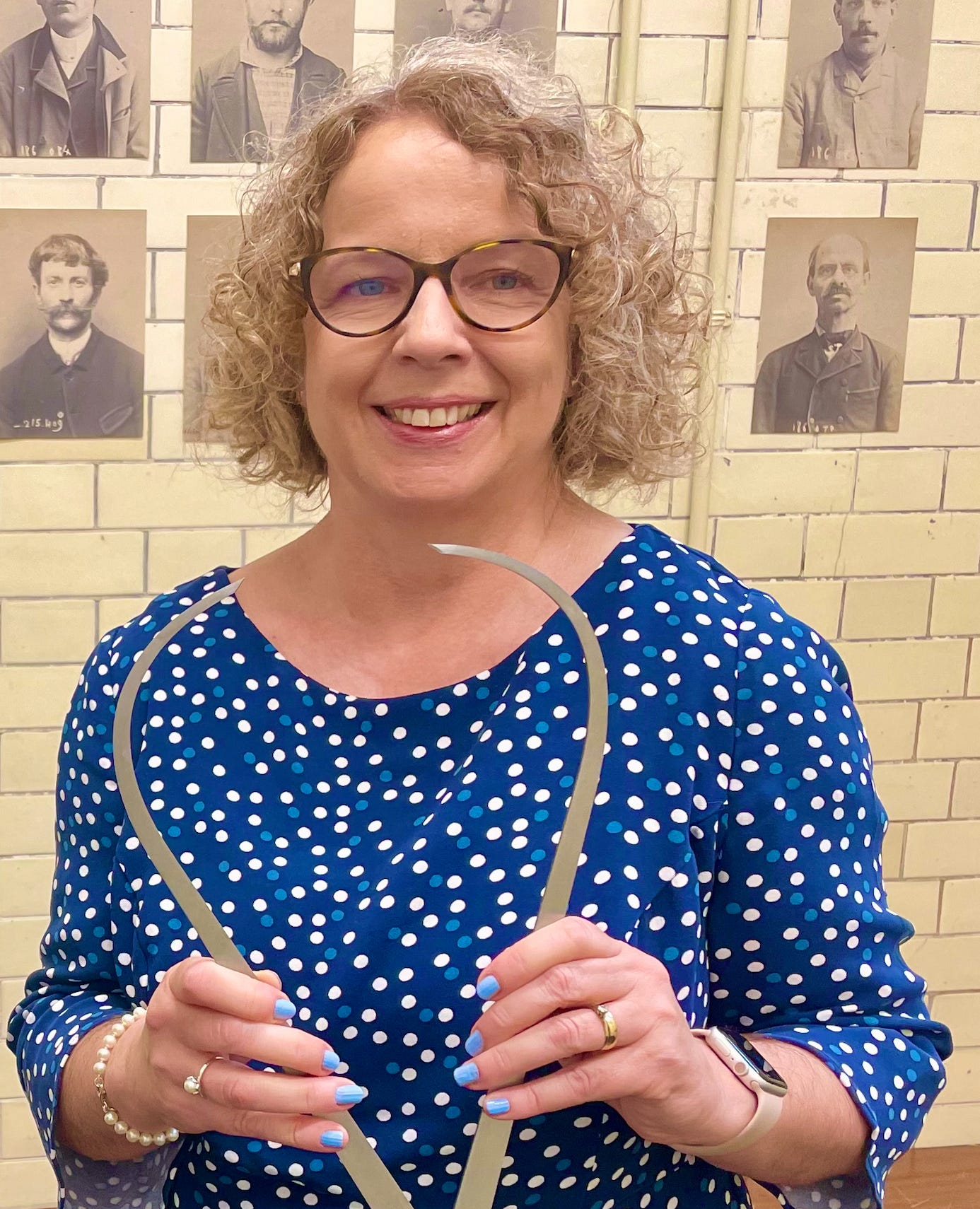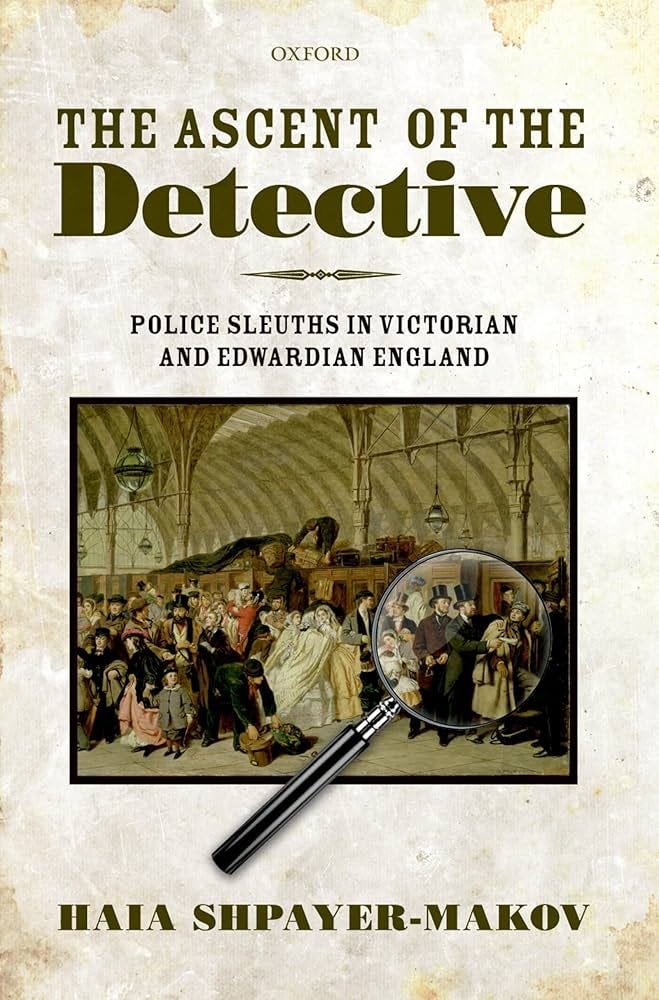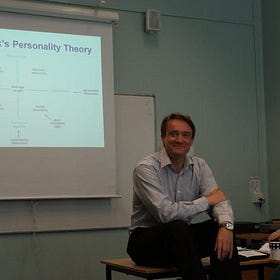Beyond the Archives: Dr. Angela Buckley Explores the History of Police Detectives.
Unveiling the History of Sleuthing and Crime Investigation
Curing Crime is delighted to share our conversation with Dr Angela Buckley. Dr. Buckley is a historian who specializes on the history of detectives and their sleuthing. Her work examines detective practices, specific crimes, criminals, and the theories of criminologists.
CC: What sparked your interest in your field of study? Was there anything specific?
My interest in historical crime began with my own family. During a break in my career as a modern foreign languages teacher, I began researching my family history, and I discovered that many of my ancestors, most of whom were poor, broke the law – I even had one infamous family member who ran a brothel in Victorian Manchester! This opened up a whole new career writing articles and books on crime and policing history and later led to my doctoral research on detective practice.
CC: Why Substack? What do you hope to achieve here? How do you balance storytelling with academic rigor when publishing?
I had a blog for more than a decade, but it was becoming increasingly difficult to attract the attention of potential readers. I switched to Substack because the readership is more focused, and the opportunity to engage directly with other writers and historians is a much more enriching experience. My aim is to share interesting information about the history of crime, detectives and forensic science with a wider audience and, although my writing style tends to be more informal than academic, all my work is supported by rigorous research based on primary records and appropriate secondary sources.
CC: Briefly, tell us what you study and, in your opinion, what is the most pressing issue or the most intriguing unanswered question in your field. Why do you think it matters today?
My research is mostly about the history of detectives and their groundbreaking investigative work. There has been very little research into this subject, especially in relation to detectives working outside London, which is the reason I wrote my doctoral thesis on the topic. However, as my work is new within the field, it has raised even more questions about how early investigators developed their sleuthing skills, for which further research is required. The subject is relevant today, as many of the current investigative practices have their roots in the past and, despite the advances in science and technology, some fundamental detective practices still endure.
CC:What’s the most surprising or counterintuitive thing you’ve learned in your research?
It’s easy to think that development is linear and logical, and it felt counterintuitive to discover in my research that this is not always the case, and that historical practice in relation to investigative policing did not evolve in a logical or effective manner, as Victorian and Edwardian detectives were often slow to adopt new practices and tended to rely on their personal experience. My research has been full of surprises, such as the fact that Manchester City Police created a detective department before Scotland Yard, or that Birmingham detectives developed a database of criminal records based on sketches of tattoos!
CC: Are there any historical cases or theories that you believe deserve more attention? Why?
I feel strongly that we need to examine more historical crime cases and detective investigations which took place outside London. Traditionally, the academic focus has been on the capital and on the work of Scotland Yard, and this tendency persists to the present day. I based my research on Manchester, Liverpool and Birmingham, and I uncovered so much new and enlightening information, as well as many fascinating but completely forgotten historical crime cases.
CC: What books, films, or documentaries would you recommend for someone looking to understand your field better?
The key academic text on detective history is The Ascent of the Detective: Police Sleuths in Victorian and Edwardian England, by Haia Shpayer-Makov, which was the inspiration and starting-point for my own research.
Also, The Suspicions of Mr Whicher by Kate Summerscale offers a compelling account of a Victorian detective. There are very few films or documentaries on detective history, and most of them focus on the investigation into the Whitechapel murders in 1888, which is not the best example of historical detective policing!
CC: If the public could grasp just one key idea about crime and justice, what would it be and why?
That it’s important to study the wider picture and to examine the links between crime and justice, and other aspects of society, such as environment, social conditions and class, as well as ideologies, societal challenges and trends in criminal activities. Studying historical cases offers us an important insight into the lives of those who came before us but also relevant lessons for today.
CC: What are the biggest historiographical challenges in your research and how do you overcome them?
The biggest challenge for my research is the availability and limitation of primary sources. As I tend to focus on crime cases outside London, I have to rely on regional archives, for which there is no standardisation in record acquisition and preservation, and many documents have not survived. I often resort to the National Archives, as they hold trial records from all parts of the country. Despite the challenges, I love the hunt, and it is an amazing feeling when I come across an elusive piece of information which adds to my knowledge.
CC: You must find many dark, disturbing, and challenging materials during your research. How do you deal with this work?
I am sometimes quite deeply affected by historical crime cases, especially in relation to domestic abuse and infanticide, and I deal with disturbing material by restricting my research and interest to my working hours. I rarely read about historical crime or watch true crime programmes in my free time – I’m more likely to read Jane Austen or watch a Mexican soap opera!
CC: Given the period of your study, what role does professionalization play in shaping detective practices? To what extent are advances in science and medicine significant?
The professionalisation of policing, especially in relation to the advances in forensic science, is a very significant factor in the development of detective practice. My doctoral research demonstrated that, during the Victorian and Edwardian periods, scientific techniques were gradually introduced into and adopted by the borough police. However, at the same time, regional detective officers continued to rely on traditional detection skills and strategies, such as making inquiries and using informants, which led to a more ‘blended’ approach to the investigation of crimes.
CC: Do you think true crime as a genre helps or harms public understanding of crime? Are there ethical concerns in how it’s presented?
I think that there is a very fine line, within the presentation of true crime, between informing the public and pure entertainment, and I am often uncomfortable about how real-life crime cases, especially those which are more recent, are portrayed in the media, particularly in documentaries and films. However, there is a recent change in the focus of some books and programmes to place the victims back at the centre and to spend less time examining the perpetrator, which I certainly welcome.
CC: We think our readers would find your work valuable. Could you recommend 2-3 of your posts?
Thank you! For an introduction to my work, I’d recommend:
We have published other articles in our Beyond the Archives Series:
Curing Crime Interviewed Jason Frowley PhD who writes about crime and psychology.
Beyond the Archives: Jason Frowley Exploring Psychology & Criminology
For our second edition of Beyond the Archives, we reached out to Dr Jason Frowley PhD from Crime & Psychology to chat about his work and goals here on Substack. Jason was one of the first friends we made here on Substack, and we are so delighted to chat with him and read him.
Our first Beyond the Archives Post was an interview with PhD Candidate Sophie Michell
Beyond the Archives: Sophie Michell Reconstructs The Lives of Murder Victims
We are excited to engage with other Substack creators who write on related issues.











Excellent piece: big fan of anyone trying to move the historical conversation on British criminal justice away from London!